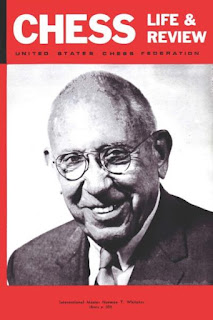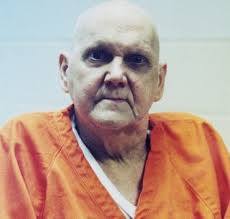Norman Whitaker (1890-1975)
Norman Tweed Whitaker was born in Philadelphia to an upper middle class family on April 9, 1890. He was an American lawyer, civil servant, chess author, criminal, and International Master of chess.
Whitaker's father, Dr. Herbert Coleman Whitaker (1862-1921), had a PhD degree from the University of Pennsylvania (dissertation: A Discussion of a Certain Differential Equation) and respected mathematics teacher at a high school in Philadelphia. Whitaker's mother, Agnes Tweed, was a champion whist card player. Norman was the oldest of four children.
In 1904, Whitaker was taught to play chess by his father.
In 1905, Whitaker watched the chess games of Harry Nelson Pillsbury (1872-1906) and became further interested in chess.
In 1907, he was Philadelphia High School Chess Champion.
Whitaker joined the Franklin Mercantile Chess Club in Philadelphia and played in their team chess matches.
Norman Whitaker graduated from the University of Pennsylvania with a Bachelor's degree in German literature. While attending the university, Whitaker played on their intercollegiate chess team.
Whitaker represented the United States against England in two transatlantic cable university challenge matches. He won his game in March 1909 as Board 3 and drew his game in 1910 against his English opponents.
He then went on to Georgetown University and earned a law degree. He later earned 3 law degrees.
In January-February 1913, Whitaker played in the Second American International Tournament round-robin at the Manhattan Chess Club, scoring 5.5 out of 13 and tied for 8th-9th place. The event was won by Jose Capablanca.
In 1914, Whitaker challenged American chess champion Frank Marshall (1877-1944), but the two could not agree to financial terms.
In August 1915, he took 2nd place in the 16th Western Chess Association Open (US Open), won by former U.S. chess champion Jackson Showalter. Whitaker won one game and lost 6 games.
In 1916, Whitaker was practicing law on F street in Washington, D.C. He was a patent attorney for the United States Patent and Trademark Office.
In 1916, Whitaker lost a match against Jackson Showalter, played in Georgetown.
In 1916, he tied for 4th place in the 17th Western Chess Association Open (US Open) held in Chicago, won by Edward Lasker.
In 1918, he was one of the strongest chess players in the country. In that year, Whitaker defeated Showalter in a match with 4 wins, 1 loss, and 3 draws.
In September 1918, Whitaker played in the 19th Western Chess Association Open (US Open) in Chicago, He tied for 2nd place, behind Boris Kostic.
In November 1918, he joined the Army, but was discharged one day later for defective vision.
In 1920, Whitaker played Edward Lasker in the first American shortwave radio long-distance chess match. Whitaker was in Washington, D.C. and Lasker was in Chicago. There was a pre-arranged time limit of 3 hours for the game, which was unfinished after 25 moves. Jose Capablanca adjudicated the position as a win form Whitaker.
In 1921, Whitaker took 2nd place in the 8th American Chess Congress, held in Atlantic City, won by David Janowski. Whitaker's performance rating was 2625.
In November 1921, Norman Whitaker, his brother Roland (another patent attorney), and sisters Dorothy Whitaker Hegarty and Hazel, were arrested and indicted under the Dyer Act for stealing automobiles and collecting on the insurance across state lines. Norman Whitaker was convicted, but later escaped. [source: Philadelphia Evening Public Ledger, November 26, 1921 and Washington Times, Jan 13, 1922, p. 13] The news of the Whitaker family arrests led to their father, Herbert, dying of a heart attack on November 17, 1921.
In 1923, he tied for 1st in the U.S. Open.
In 1924, Whitaker was tried in a court in Los Angeles for the theft of a physician's car in Ocean City, New Jersey.
In October 1924, Whitaker was disbarred from the practice of law due to the commission of a crime involving moral turpitude. Whitaker appealed, but lost. [source: Evening Star (Washington, DC), June 28, 1924, p. 31]
In 1925, Whitaker was sent to the United States Penitentiary at Leavenworth, Kansas for two years. He was released in 1927.
In September 1927, Whitaker won the first National Chess Federation (NCF) Congress chess tournament, held in Kalamazoo, Michigan. He scored 9 out of 11. [source: Decatur Evening Herald, September 5, 1927]
In 1928, while on his honeymoon, he went to The Hague to play in the Amateur World Chess Championship. He tied for 4th place. Max Euwe won the event. While traveling to the event by train in Europe, his train derailed which killed 9 people and severely injured his wife, Beatrice (1906-1944).
In 1930, Whitaker represented Washington, D.C. against London in a transatlantic radio match. Whitaker lost to former British champion Sir George Thomas (1861-1972).
In 1930, he tied for 1st in the US Open.
In 1930, Norman Whitaker was arrested in Pleasantville, New Jersey after being caught depositing slugs in the coin box of a telephone pay station. He then failed to appear in court to answer to the charge of defrauding the telephone company.
In 1931, a friend of Whitaker, who was competing in a U.S. correspondence chess championship, suddenly died. His widow needed money, and this gave Whitaker the idea of finishing his friend’s games without letting anyone know. Whitaker wound up winning the tournament. [source: Chess Life & Review, Aug 1975]
In 1932, Whitaker gained notoriety during
the kidnapping of Charles Lindbergh, Jr. A former FBI Agent named Gaston B. Means
concocted a scheme to swindle $104,000 from a wealthy heiress by claiming to be
in contact with the kidnappers. Means intended to use Whitaker (called "the Fox") as the bagman to
pick up her money, but both were arrested in Brooklyn and convicted. Whitaker was later
convicted of attempted extortion. He claimed that the Lindbergh kidnappers had
refused $49,500 of the ransom money paid by Mrs. Evalyn Walsh McLean because the
serial numbers on the money had been published. Mrs. McLain was a Washington Post heiress and once owned the Hope Diamond. Therefore, he demanded
replacement money in the amount of $35,000, in exchange for which he promised
to return the original $49,500 plus the baby. That was when the FBI was finally
called in. Whitaker never got any of the money and, when asked what happened to
the money, Whitaker replied, "I do not know, and I wish I did".
Whitaker got out in just 18 months. He served 18 years in Alcatraz and was a friend
of Al Capone there. [source:
New York Times, June 29, 1932, p. 9
and Hilbert, Shady Side: The Life and
Crimes of Norman Tweed Whitaker, Chess Master, 2000]
In 1947, Whitaker returned to chess after a 16-year gap, and played in the U.S. Open in Corpus Christi.
In 1948, he tied for 9th place in the U.S. Chess Championship, won by Herman Steiner.
In 1950, Whitaker was convicted of sexual molestation of a 12-year-old girl.
In July 1952, Whitaker was rated 2190 by the USCF.
In 1955, Whitaker was expelled from the USCF due to his past deeds, but he sued the USCF and he was allowed to play in USCF events. (sources: Chess Life, Apr 5, 1955, p. 1 and May 20, 1955, p, 1)
In 1956, he played in the Eastern States Open Chess Championship, won by Hans Berliner.
In 1956, he played 1st board on the Log Cabin Chess Club team, based in New Jersey. 13-year-old Bobby Fischer played 2nd board.
In 1957, he directed the Eastern Open chess tournament.
In 1960, he wrote 365 Selected Endings.
In 1960, Whitaker drew a chess match against German Grandmaster Friedrich Saemisch (1896-1975).
On August 31, 1961, chess master Norman Whitaker (1890-1975), chess expert Glenn Hartleb, and a 16-year-old boy were driving in Arkansas when they got into a car wreck, killing Glenn Hartleb. Apparently, Whitaker and Hartleb were too tired to drive, and they allowed the 16-year-old to drive. He lost control, hit a bridge abutment and overturned the car. They were returning home after playing in the US Open in San Francisco.
In 1962, Whitaker drove from Germany to Oslo in his Volkswagen beetle and crashed his car when he reached Oslo. He was hospitalized for chest wounds for a few days after that.
In 1965, at the age of 75, he was awarded the International Master title by FIDE.
In January 1972, at the age of 81, his USCF rating was 2142.
In January 1974, Whitaker attended the opening banquet of the Korchnoi-Mecking Quarter Finals match in Augusta, Georgia. He had front row seats for the match.
Whitaker died on May 20, 1975 in Phenix City, Alabama at the age of 85. He was an active chess player until the very end. [source: Gates, "Norman T. Whitaker," Chess Life, Aug 1975, p. 521] Norman is buried in Parkhill Cemetery in Columbus, Georgia.
In 2000, John Hilbert wrote, Shady Side: The Life and Crimes of Norman Tweed Whitaker. It won the Chess Cafe "Book of the Year."




Comments
Post a Comment